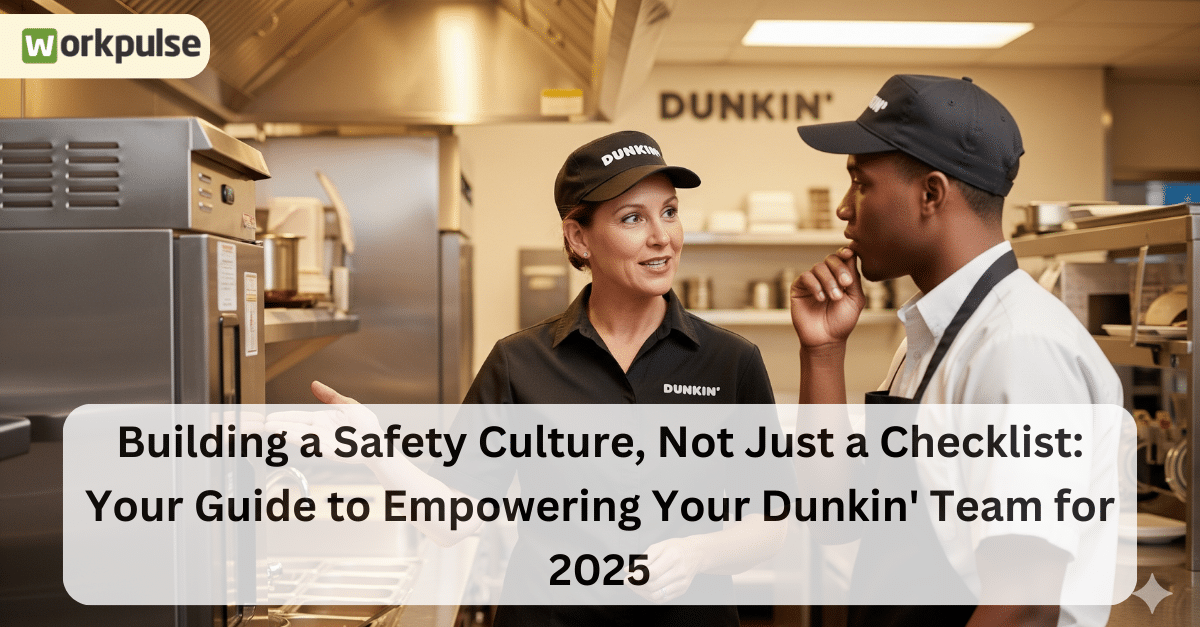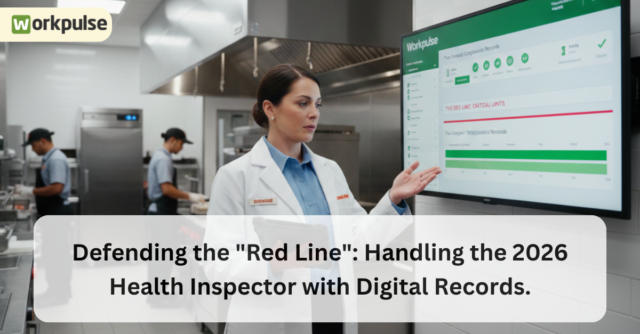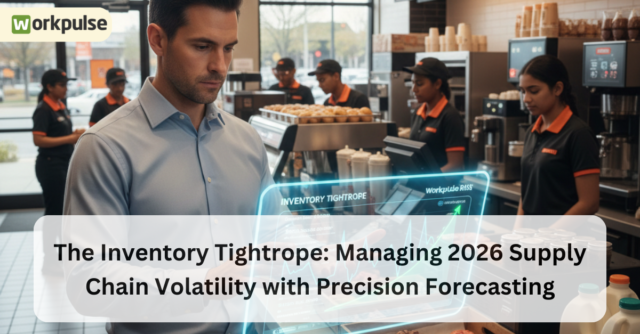Every Dunkin’ has checklists for food safety. Temperatures are logged, surfaces are cleaned. A pen is used to mark a box, and a form is filed away. But is your team merely checking boxes, or are they genuinely invested in preventing a food safety incident? This is the critical difference between compliance and culture.
A checklist-only approach is a fragile defense against a very real and costly threat. A recent study found that a lack of consistency in food safety procedures is a top driver of preventable violations that can result in fines of over $1,000. In a competitive 2025 QSR landscape, especially heading into the high-stakes Q4 holiday season, relying on a piece of paper is a risky gamble with your brand and your profits.
This post will guide Dunkin’ managers beyond basic compliance to building a robust food safety culture. You’ll discover how to empower your team to be proactive guardians of safety, safeguarding your brand and bottom line for a prosperous 2025.
The Fragile Defense: Why a Checklist-Only Approach Fails in 2025
On the surface, a paper checklist seems sufficient. But beneath the surface, it’s a fragile defense that is destined to fail, especially in a demanding 2025 QSR landscape where the stakes are higher than ever.
The “Pencil Whipping” Problem
Manual, paper-based checklists are notoriously unreliable. The simple act of checking a box, often with no timestamp or verification, can be easily falsified. This “pencil whipping” creates a false sense of security, where a manager believes everything is fine, when in reality, a critical food safety step was missed. This lack of accountability makes it difficult to track who did what, when, and how thoroughly.
A Reactive, Not Proactive, Strategy
Checklists are inherently reactive. They document what was done, but they don’t help you identify what needs to be done or why something went wrong. A paper-based system fails to provide real-time insights, meaning you’re operating with a blind spot. You won’t know if a critical food item is at the wrong temperature until the end of the shift, long after the problem has occurred. This reactive approach misses a critical opportunity to prevent issues before they can escalate into a violation or, worse, a foodborne illness outbreak.
The High Cost of Lapses
A food safety lapse can be a catastrophic event for a QSR. A single foodborne illness outbreak can cost a fast-food restaurant between $3,968 to $1.9 million, depending on the severity of the outbreak. This cost, which includes fines, legal fees, and brand damage, is a direct result of a fragile food safety defense. In 2025’s unforgiving market, a checklist-only approach is a gamble with your brand and your bottom line.
The 2025 Imperative: From Compliance to Culture
In the fast-paced and unforgiving QSR landscape of 2025, simply checking boxes isn’t enough to secure your franchise. The industry is shifting, and the expectation has moved beyond basic compliance to a full-fledged food safety culture.
The Evolving Regulatory Landscape
The FDA’s “New Era of Smarter Food Safety” is actively pushing for the industry to embrace digital traceability and a stronger food safety culture. This isn’t just a suggestion; it’s a clear signal that the standards are changing, and a paper-based, reactive approach is quickly becoming obsolete. The new era demands a proactive, data-driven system that provides real-time visibility into every step of your food safety process, ensuring you’re not just compliant, but consistently excellent.
The Power of Employee Engagement
Your team is your first line of defense against a food safety incident. The difference between a team that just follows a checklist and a team that takes ownership of their role is immense. Engaged employees are more likely to adhere to safety protocols, proactively spot issues, and take accountability for their actions. This shift from a “food safety cop” mentality to a “food safety coach” one is a key driver of a strong safety culture and a direct way to reduce the risk of costly violations.
The High Stakes of Q3/Q4 2025
The need for a robust safety culture is amplified during the high-volume Q4 holiday season. With increased traffic, seasonal menu complexities, and the onboarding of new or temporary staff, the risk of a food safety lapse is at its peak. A strong culture of safety ensures that even during the busiest rushes, your standards remain high, protecting your brand’s reputation and your bottom line when it matters most.
Empowering Your Team: Pillars of a Strong Food Safety Culture with Workpulse Book
Moving from a reactive, checklist-only approach to a proactive food safety culture requires more than just a change in mindset—it requires a powerful tool that empowers your team. This is where Workpulse Book becomes the cornerstone of your food safety strategy, enabling your team to become proactive guardians of safety.
Pillar 1: Digitalizing Daily Routines
The first step to building a strong safety culture is to eliminate the flaws of a paper-based system. Workpulse Book replaces paper logs with intuitive digital checklists for everything from temperature checks to cleaning schedules. This eliminates the risk of “pencil whipping” and ensures every entry is accurate, time-stamped, and instantly accessible. The system can even integrate with Bluetooth thermometers to automatically log temperatures, removing the risk of human error altogether.
Pillar 2: Real-Time Oversight & Accountability
As a manager, you can’t be everywhere at once. Workpulse Book gives you a live dashboard of your store’s daily food safety tasks, so you have a complete overview of your team’s performance. You receive instant alerts for missed tasks or non-compliant entries, allowing you to address issues in real time before they can escalate. This system provides clear accountability for every team member, ensuring that a critical food safety step is never overlooked.
Pillar 3: Continuous Training & Knowledge Sharing
A strong safety culture is built on knowledge. Workpulse Book can integrate SOPs and training materials directly into tasks, providing “just-in-time” learning for your team. This ensures that every employee, from your newest hire to your most experienced team member, is following the exact same, up-to-date procedures for food handling and cleanliness.
Pillar 4: Empowering Feedback & Corrective Actions
Workpulse Book gives your team a voice and a sense of ownership. Team members can easily log issues, assign corrective actions, and track their resolution within the app. This fosters a sense of shared responsibility and turns issues into learning opportunities, allowing your team to become a proactive part of your food safety solution.
Real-World Impact: The Dunkin’ Safety Champion
It’s one thing to talk about features; it’s another to see how a manager’s reality is genuinely transformed. Imagine a Dunkin’ manager, who used to dread the surprise inspections that came with a checklist-only approach.
Before Workpulse Book: The “Food Safety Cop”
This manager remembers the stress of a surprise inspection. The moment the inspector arrived, there was a frantic search for misplaced logs, and a quiet panic about a forgotten temperature check from the day before. The manager felt like a “food safety cop,” constantly reminding staff, chasing paper, and dreading the moment when the inspector would find a flaw in the system. They experienced a minor violation that resulted in a fine, and it left them with a sense of dread and a loss of confidence in their team.
After Workpulse Book: The Shift to Coach
Determined to gain control, this manager implemented Workpulse Book. The transformation was profound. Instead of dreading inspections, they now approach them with a quiet confidence.
- No More Scrambling: Daily digital checklists for food safety, cleanliness, and operational standards became a seamless part of their routine. They no longer had to hunt for a misplaced logbook; all records were instantly accessible on their tablet or phone.
- Proactive Problem Solving: Issues were spotted and corrected immediately by their team, often within minutes of being identified, long before an inspector ever stepped through the door. This proactive approach significantly reduced the risk of compliance violations and the stress associated with them.
- Reclaimed Time & Confidence: The manager gained hours back each week, no longer buried in paperwork or agonizing over potential compliance failures. They could focus on coaching their team, driving sales, and building customer loyalty, feeling in control and experiencing genuine peace of mind.
This isn’t an isolated incident; it’s the standard of success achieved by Dunkin’ managers who prioritize a proactive, digital approach to food safety. They moved from reacting to problems to actively preventing them, securing their operations and their sanity.
Your Guide to a Resilient Dunkin’ in 2025: Invest in Culture
The insights are clear: your Dunkin’ franchise’s food safety strategy is only as strong as its culture. In a demanding 2025 landscape where every decision counts, a paper-based, checklist-only approach is not a sustainable option.
Building a resilient food safety culture is more than just an operational improvement; it’s a strategic investment in your franchise’s future. By leveraging solutions like Workpulse Book, you transform a daily chore into a powerful engine for growth.
This proactive approach positions your Dunkin’ franchise to:
- Protect Your Brand’s Reputation: By consistently upholding the highest standards of food safety, you build invaluable customer trust and loyalty.
- Secure Your Bottom Line: By proactively preventing costly violations, you ensure your hard-earned profits are secure.
- Empower Your Team: A digital, transparent system fosters accountability and a culture of continuous improvement, turning your team into active participants in compliance, not just passive observers.
- Achieve Operational Excellence: When you’re not constantly putting out fires, you can focus on building a more efficient, profitable, and enjoyable work environment for everyone.
Don’t let a fragile food safety defense hold your Dunkin’ franchise back from its full potential in 2025. Invest in the technology that provides the precision and foresight needed to achieve unparalleled success and ensure your franchise is not just compliant, but consistently excellent.
From Checkmarks to True Guardians.
The daily food safety checklist is a necessary part of your Dunkin’ franchise, but it’s not a complete strategy. The critical difference between compliance and a true safety culture is the key to protecting your brand and your bottom line.
In a demanding 2025 landscape where every decision counts, relying on a fragile paper-based defense is simply leaving your franchise vulnerable. It’s about more than just avoiding a fine; it’s about strategically positioning your business for resilience and growth.
Workpulse Book is designed to be your partner in this transformation. It empowers Dunkin’ managers and their teams to:
- Replace the risk of paper logs with the confidence of a flawless digital system.
- Build a foundation of trust and accountability within your team.
- Proactively prevent costly violations and brand-damaging incidents.
- Safeguard your franchise’s reputation and ensure sustained profitability.
Don’t let your food safety strategy be a series of checkmarks. Embrace the power of a digital system that empowers your team to be true guardians of your brand, ensuring your Dunkin’ franchise flourishes in a prosperous 2025.




